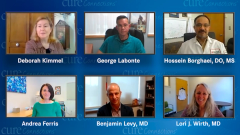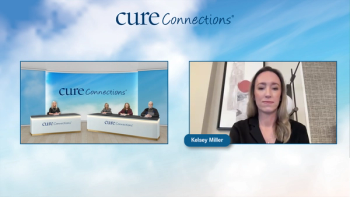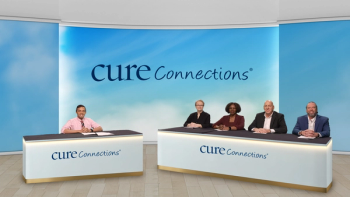
Becoming Informed About Comprehensive Genomic Profiling
Resources available to support patients and community oncologists who are interested in learning more and gaining access to comprehensive biomarker testing.
Episodes in this series

Hossein Borghaei, DO, MS: What advice would you give to others who might be going through the same thing?
George Labonte: Certainly, there’s some confusion regarding genetic testing. Dr Wirth did a good job clearing up the somatic vs. familial. But the biggest thing is to advocate for yourself and drive your own bus. I don’t remember who said it, but sometimes patients don’t want to have to make a decision and just want the doctor to make the decision. Get your hands on some guidelines. There are ATA [American Thyroid Association] guidelines for medullary thyroid cancer that I’ve highlighted and read a million times, as Dr [Lori] Wirth knows. Fortunately, Dr Wirth is an expert in this type of cancer. For more of the rural communities across the country that don’t have access to a center of excellence, it’s important for them to get all the right information on genetic testing because precision medicine is definitely the way of the future. My dream is that when I’m a grandfather, 80 years old, I can say, “Back in my day, when you got cancer, they actually had to cut you open to take it out. Now they just give you a shot or a pill and there’s no surgery involved.” That’s my dream, and the way the development of technology in medicine is moving, I can see that—maybe not in my lifetime, but certainly in the future.
Hossein Borghaei, DO, MS: Yeah, we’re definitely hoping for something like that. Ms. Kimmel, how about you, what message do you have for people who are going through the process the way you did?
Deborah Kimmel: I’d like to echo what George and Dr Levy said. You have to be your own strongest advocate. There’s a responsibility on the patient to come up to speed and to be prepared for appointments. I come to appointments, Dr. Levy probably knows, with my pad of questions because I’ve had to learn about this from ground zero. This is something that does need to be done, and it goes to the point that not everybody is lucky enough to have an oncologist who’s educated, informed, and forthcoming about biomarker testing. But I tell everybody. I say, “You have to look at your oncologist and say, ‘Give me the one pager that explains biomarker testing.” This is a one-page document that every oncologist has, and it explains biomarker testing. It has a little box with the benefits. It’s has a little section with the process of biomarker testing. It’s got an area with likely outcomes, and an area that has some credible sources for more information. Every oncologist ought to have those to hand to his patients because biomarker testing has revolutionized a lot of cancers and it changed my life, it saved my life. But I think about the people’s lives it has not saved, simply because they didn’t know and their doctors didn’t know about the testing. There needs to be more promotion, and I would tell anybody who’s going through this to ask your oncologist to give you the information. They should have printed standardized materials to hand out, an easy-to-understand one pager that can help the patient to understand. I’m much more knowledgeable, so I hope Dr Levy agrees with that. I was totally in the dark about what all this was when I was first being diagnosed.
Hossein Borghaei, DO, MS: Those are really important points. Ms. Ferris, are these similar stories to what you hear from your patients?
Andrea Ferris: Yeah, they are. To Deborah’s point, a couple of weeks ago—Dr Levy has been a part of it—a campaign called No One Missed launched. There’s a website, noonemissed.org, that includes the one pagers to explain it to patients in plain language of what biomarker testing is, how to read a test report, and questions to ask your doctor. It’s a collaborative campaign with pharmaceutical companies, diagnostic companies, providers, societies, patient groups. It’s one collective thing that unifies a message. Now there are resources out there for doctors, patients, and others to get that information., I’d say that it’s consistent with what we hear, which is why we try to provide the information to people.
Hossein Borghaei, DO, MS: Great, thanks.
This transcript has been edited for clarity.


